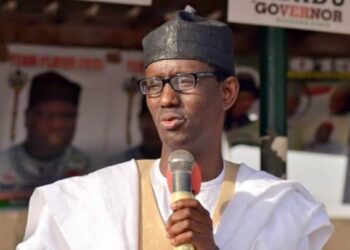New consignment arrives March
By Patrick Andrew
Abuja
Nigeria Railway Corporation (NRC) has admitted that it currently uses old, dilapidated locomotive coaches on the Abuja-Kaduna route and, indeed other routes, pending the arrival in the country of its brand new locomotives, March this year.
The clarification came against the backdrop of frequent breakdowns on the Abuja-Kaduna rail route.
Blueprint recalls that the route had suffered engine failures twice causing unbearable delay and frustration to commuters who had hoped to ‘rush’ into Kaduna and Abuja, respectively, to transact businesses during the official hours and return home to their families.
This occurred barely six months after the services commenced operations, thus fuelling speculations among Nigerians that the engines were not of the right standard. Explaining reasons for the development, the Corporation claimed it was compelled to resort to the dilapidated locomotive coaches used by the China Civil Engineering Construction Company (CCECC) during the rehabilitation, construction and experimental works of the rail lines, because of the delay in the delivery of its new locomotive engines.
The Manager, Operations, Idu Station, Mr. Victor Adamu, who disclosed this to Blueprint in an exclusive interview, said the recent breakdown arose from “mechanical faults with the locomotive, which the engineers of the NRC were able to rectify without cancelling the train services.”
“Yes, they are old engines, but the situation was arrested and I must say again that there were minor mechanical faults which our engineers were able to fix. The causes of the breakdowns were not major problems,” Adamu said, assuring that such ugly occurrence would soon be a thing of the past.
Corroborating Adamu’s claims, Paschal Nnorom, Head of Station, Idu, confirmed that the Abuja-Kaduna route depended on the old locomotives for its services.
According to him, these near-moribund locomotives were deployed by the CCECC during the construction works and for experiment while the station and lines were under construction.
Nnorom, who said the NRC had to depend on what was available pending the delivery of its “new and modern locomotives, sometime in March, this year.”
“You can’t run away from the truth. In fact, you can’t hide the truth, and even if you do, you can’t hide it forever. The truth is, we are using those working locomotive coaches used (by CCECC) during the construction works on the rail lines.
“We are using them now until the arrival in the country of our brand new and modern locomotives coaches which have been ordered for, come in,” he said, describing the fuss over the recent breakdown as unnecessary.
Similarly, a staff of the CCECC at the Idu Station, who spoke on condition of anonymity, equally confirmed that the firm had to insist on use of the old, dilapidated construction locomotive coaches because of the pressure from the federal government to meet ‘deadline’ as well as inability of the foreign partners to deliver the new engines on time.
He said: “Recall that the major construction works on the Abuja-Kaduna rails were completed in 2014, but delay in delivery of the new and modern engines prevented the last administration from commissioning the project.
“Also, the present government had planned to commission the Abuja-Kaduna route in March, 2016, but for this and other reasons, that date was missed and officials from the Ministry of Transport were unhappy and subsequently exerted more pressure on CCECC and the NRC to ensure the rail services on the Abuja-Kaduna route comes on stream.”
It was not certain though whether the expected coaches were part of those the NRC Managing Director, Mr. Fidet Okhiria, had disclosed the Corporation was in the process of bringing in a 150-kilometre per hour locomotive on Abuja-Kaduna rail gauge to increase carriage capacity and meet passengers’ demand for more coaches.
This is because Okhiria, had, last year November, assured that once the designed specification was confirmed by the engineers, the corporation would start making arrangements for its shipment and subsequent deployment.
Between late December 2016, and the second week of January, this year, passengers were subjected to painful ordeals following breakdowns of the train some 50 kilometres before Rigasa.
The development forced many to question the health of the engines as they wondered whether they are ‘new’ as claimed by the federal government, and for which a whopping sum of $1.45 billion was said to have been spent on the project.
Passengers have equally raised other fears: Though in January, 2016, when the high-speed railway was publicised, it claimed 120-150kilometres per hour, which is nearly an hour distance between Abuja to Kaduna and vice-versa.
However, since it commenced operations in July, last year, commuters say it takes between two hours and 20 minutes to two hours 40 minutes to Kaduna from Idu Station in Abuja, without traffic. This implies that the trains were slower than originally intended by the federal government.



